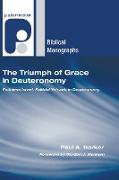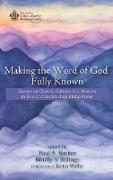- Start
- The Triumph of Grace in Deuteronomy
The Triumph of Grace in Deuteronomy
Angebote / Angebote:
Does the Old Testament have an optimistic outlook for the people of God, ancient Israel, or is it pessimistic? The strands of optimism and pessimism seem to be juxtaposed throughout. In this study of Deuteronomy, a linchpin book within the Old Testament, the so-called tensions between optimism and pessimism are shown to cohere theologically. Despite the faithlessness of Israel, Yahweh's faithfulness to his promises results in the triumph of grace.
The Book of Deuteronomy is frequently misread as a legalistic document with a somewhat mechanical ethic of rewards and punishments. Paul Barker shows convincingly that, on the contrary, it engages subtly and profoundly with the issue of law and grace. His lucid analysis of key passages of the book makes an important contribution to the exegetical and theological study of the book.
--Gordon McConville, Professor of Old Testament Studies, University of Gloucestershire
This is an important and compelling contribution to our understanding of God's unfolding master plan in the Old Testament. Paul Barker's careful and penetrating analysis of key chapters in Deuteronomy not only opens up crucial aspects of the biblical theology of divine grace and human sinfulness, but exposes fatal flaws in earlier attempts to read the text diachronically. This is a 'must-read' for anyone studying Deuteronomy.
--J. Gary Millar, author of 'Now Choose Life: Theology and Ethics in Deuteronomy'
This . . . is a most important discussion for anyone trying to understand the theology of Scripture and to preach it in a Christian context. But it is also a most thorough work that interacts with all the significant recent discussions of Deuteronomy in a very judicious way.
--Gordon Wenham, from the Foreword
Paul A. Barker is lecturer in Old Testament at Ridley College, Melbourne, Vicar of Holy Trinity, Doncaster, and Archdeacon of Box Hill. His PhD thesis was awarded by the University of Bristol under the supervision of Professor Gordon Wenham.
Folgt in ca. 10 Arbeitstagen




